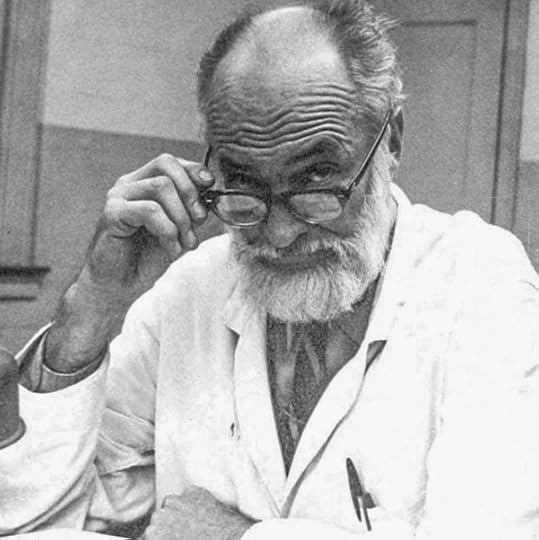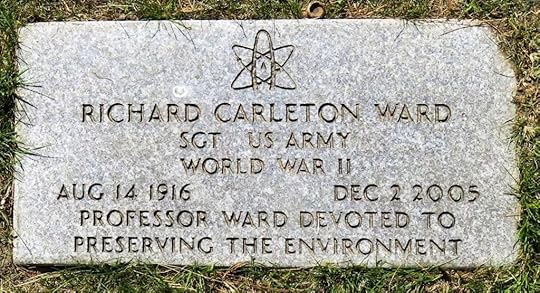Remembering R.C. Ward
The first thing R.C. Ward taught in our biology class at Guilford College was his eponymous Law:
“If it works, it’s good.”
He frequently mentioned Ward’s Law by name and required it as an answer to nearly every test. As Richard Nilson explains here, Professor Ward was not a normal dude:
It was 1966 and I was a freshman in college taking an intro to biology class with Richard Carleton Ward, a teacher of peculiar manners and prejudices. I could write a whole chapter on him, the way he spoke out of the side of his mouth in a gravelly grunt, the way he bought conspiracy theories, his suburban house blocked from view in a bourgeois neighborhood by a jungle of bamboo, vines and weeds. He wrote an article for the underground newspaper I was publishing in which he complained ferociously about students’ inability to spell the word, “spaghetti.”
From another Richard Nilson post:
One day, he brought a potted plant to class, and as the bell sounded, he held it up in front of us. “This is the sacred lotus of India,” he said through his teeth. “It sheds water as we are supposed to shed our sins.” He took up a pitcher of water and poured it over the plant, dripping onto the floor, saying to us in biblical voice, “Go forth and sin no more.”
In that same post, Richard reminded me of another Ward’s Law:
His explanation of sex on campus was: “Some do, some don’t.”
He pronounced “some” with a whistled s. That went for every word with an s or a c that sounded like s, such as in the word “pronounced.” All came not just with an ssss sound, but with a  .
.
So let’s call those Ward’s First and Second Laws:
If it work , it’
, it’ good.
good. ome do, and
ome do, and  ome don’t.
ome don’t.There is a lot more about Professor Ward in Green-Wood.com‘s WWII project, featuring biographies of deceased soldiers with surnames running from Pizza to Zeldmann. Scroll way down and you’ll find eight paragraphs above this shot of his grave marker:
Because you probably won’t click on the photo or the link above it, and I want to give the man and his laws full respect, here are those paragraphs:
WARD, RICHARD CARLETON (1916-2005). Sergeant, United States Army. The Ward family members were among the early English settlers in Rhode Island, arriving in the 1670s. John Ward had been an officer in one of Cromwell’s cavalry regiments, arriving in America from Gloucester, England, after the accession of King Charles II. Another ancestor married the son of Benedict Arnold. Burr H. Nicholls and Rhoda Holmes Nicholls, Richard Carleton Ward’s maternal grandparents, were both noted artists. Burr Nicholls was an oil painter and Rhoda Holmes Nicholls was a painter, water colorist, and art editor in the early 1900s.
The 1918 Darien, Connecticut City Directory records the Ward family living on Runkenhage Road in the Tokeneke neighborhood. On March 19, 1927, Richard Ward was listed as sailing from London, England on the SS American Shipper, arriving in New York on March 30, 1927, with his mother Olive Nicholls Ward, age 39, and his sister, Alida Carleton Ward, age 18. Richard, 10 years old, was listed as having been born in Darien, while his mother and sister were listed as born in New York City.
The 1930 federal census lists Richard Ward’s father, Henry Marion Ward, who was 59 and a lawyer at a law office. His mother, Olive, was 42 and an interior decorator. Sister Alida was 15 and Richard was 13. The home they lived in was valued as $60,000. Richard’s grandparents were all born in New York, except for his maternal grandmother, who was born in England. The family also had a female servant living with them, listed as a 46-year-old “Negro” born in North Carolina.
Richard Ward registered in Darien for the draft on October 16, 1940, when he was 24 years old. He listed his date of birth as August 17, 1916, in Darien, and his residence as on Runkenhage Road in Darien. His contact was his mother Olive Nicholls Ward who also lived at that same address. Richard worked at S. W. Hoyt Jr. Co., Inc. on Washington Street in South Norwalk, Connecticut. He was 6′ 4½” tall and weighed 165 pounds, with a light complexion, blue eyes, and brown hair. He had a small scar on his left shoulder. He signed his registration card as “R. Carleton Ward.” He enlisted in the United States Army on December 17, 1943, and was discharged on November 5, 1949, according to Department of Veterans Affairs records.
Family trees on the ancestry website indicate that Richard married Antonina Pavlova in Canada in 1949. Per Antonina’s obituary in the Greensboro News & Record, she was born in St. Petersburg, Russia, had been a prisoner of war and, after being liberated by the Allied Forces in Austria, she met United States Army Sergeant Richard Carleton Ward there. The 1950 federal census confirms their marriage, showing Ward’s age as 31 and Antonia’s as 26. Per the 1950 United States census, they were living in New London, Connecticut, along with their newborn daughter, who had been born in Canada in August 1949, but was an American citizen. The additional information for Ward shows that he had been living at Westerly, Rhode Island, the previous year, that he had finished one year of college, and that he had served in World War II, but there was no job listed, although he was not noted as unemployed.
Antonina Ward’s 1954 naturalization record, issued in 1954 in Hartford, Connecticut, shows her residing at Bay Road in Amherst, Massachusetts. In the 1950s, Richard Carleton Ward was a botany instructor at the University of Vermont, holding a Bachelor of Arts degree and appointed in 1954, according to the school’s catalogs for 1954-55 and 1955-56. The 1956 Burlington, Vermont City Directory lists Richard and Antonina as living in Vermont. Ward was active in botanical societies and contributed to collections in many parts of the United States. For example, in 1961, he submitted several samples to the Southern Appalachian Botanical Club. Later, he was a biology professor at Guilford College in Greensboro, North Carolina.
According to Ward’s daughter Tanya, Ward and his wife had three daughters, Tamara Olive Ward, Lalla Ward Reid, and Tanya Ward Feagins. The 1970 North Carolina Divorce Index shows that Ward and his wife were divorced on November 30, 1970, in Guilford, North Carolina. In 1994, Ward was living at 8101 Oak Arbor Road in Greensboro, North Carolina and, in 1995, at 410 Guilford Avenue, Greensboro, North Carolina. Per Social Security records, Ward passed away on December 2, 2005. The Piedmont Bird Club of Greensboro, North Carolina, posted an obituary of Ward in their February-April 2006 newsletter. He was known as Carl and was active in the club for many years. He was an activist and lover of nature.
Ward was interred on October 10, 2007, in the same section as his father. His daughter Tamara’s 2014 obituary in the Greensboro News & Record, states that she was laid to rest in what was termed “the Ward family ancestral burial site.” “Professor Ward Devoted to Preserving the Environment” is carved on his gravestone. Section 77, lot 72.
Some possibly interesting bonus facts:
I started hunting down data on Professor Ward when I wanted to credit the source of Ward’s First Law, which I haven’t forgotten in the sixty years since I learned it. Short on luck in my diggings, I asked ChatGPT for help, and it produced both of the sources I used above.One of those sources, Richard Nilsen, was a year behind me at Guilford, so I am sure that, being a small college (around just 800 students), we at least breathed some of the same air now and then.Richard is a known—and excellent—writer, and much else. It is a treat to have discovered him after all these decades. Perhaps unsurprisingly, we are both from New Jersey. Related fact:::New Jersey, until the last few decades, was bereft of state colleges and universities of any prestige, other than Rutgers. So New Jersey exported more college students to colleges and universities elsewhere than any other US state. In fact, I was accepted at Guilford only because, despite bad grades and SAT scores, I wasn’t from North Carolina and would commit to come on “early decision.”I can’t find one, but I recall seeing blue bumper stickers that said, “DUKE The University of New Jersey at Durham.”My two oldest kids are related to the Ward family. That’s because one of Professor Ward’s children, Tanya, married David Feagins (son of Professor Carroll S. Feagins, who headed the Philosophy Department, where I majored). David’s brother married the sister of my first wife (both kids of Hiram H. Hilty, another faculty member), and their daughter is a first cousin to both of my two kids by that first wife, making Professor Ward their great-uncle by marriage. I think I have that right. I hadn’t thought about that until I read the long biography above.Guilford in those days required that graduating students prove proficiency in a second language. I took no language at Guilford, and my joke about German was that I took two years of it in high school—one of them twice—and gave them back when I was done. So I submitted myself to a test by the German expert at Guilford, Mary Feagins, wife of Carroll Feagins, and future grandma to my kids’ first cousin. Her test required that I read two pages of a German from a textbook out loud, and then translate it. She passed me, saying “I’ve never met anyone who could pronounce a language better while understanding it less.”Guilford has had financial woes in recent years, which is why, five years ago, I made a radically simple recommendation for it. They haven’t followed my advice, but I still stand by it.Doc Searls's Blog
- Doc Searls's profile
- 11 followers





